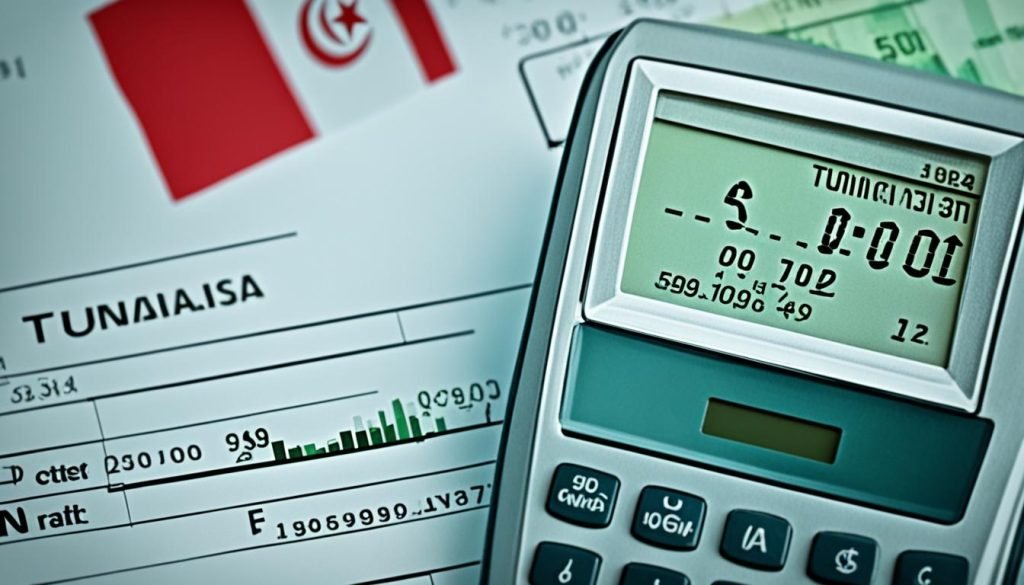Traveling to new countries often means learning their tax rules. My first trip to Tunisia was eye-opening. The bustling bazaars and lively streets were full of history. But what really caught my eye was how the country handles taxes, especially the value-added tax (VAT).
Who pays VAT in Tunisia? How does it affect business there? This question is key not just for locals, but also for global entrepreneurs eyeing the Tunisian market. Tunisia has a basic VAT rate of 19%. Some businesses might qualify for lower rates. Knowing about Tunisia’s VAT is crucial for financial success in this region.
If you’re wondering, “Do Tunisia pay VAT?” we’ve got you covered. Let’s clear up the VAT system in this engaging journey.
Key Takeaways
- Understanding Tunisia’s value added tax is essential for businesses operating within the country.
- The standard VAT rate in Tunisia is 19%, with reduced rates applicable to certain transactions.
- Tunisia VAT regulations allow exemptions and zero-rated operations for specified goods and services.
- Monthly VAT declarations and the ability to deduct input VAT are key components of Tunisia’s VAT system.
- Knowledge of VAT registration, both obligatory and optional, is crucial for compliance with Tunisian tax law.
Understanding Tunisia VAT Regulations
Understanding Tunisia VAT regulations is crucial. It involves knowing how VAT works for goods and services in Tunisia. Goods exchanged within Tunisia fall under VAT rules. This makes it vital for businesses to handle their taxes well.
Some operations are VAT-exempt, making things a bit complex. Getting a VAT refund in Tunisia requires following strict rules. Businesses need to have paid all taxes before they can ask for a refund.
The table here lays out key points about VAT in Tunisia clearly:
| Aspect of VAT | Details |
|---|---|
| Standard Rate | 19% on most goods and services |
| Exemption Criteria | Specified goods and services, as listed in the VAT Code |
| VAT Refund Eligibility | Taxes must be paid before refund request |
| Refund Process | A detailed written request to tax authorities is needed |
Finally, knowing about VAT refund Tunisia and VAT in Tunisia is important for businesses. Paying attention and managing VAT well helps avoid financial issues. It makes dealing with tax matters much simpler.
The Scope and Rates of VAT in Tunisia
It’s key to understand VAT in Tunisia for commerce participants. This country’s business tax system features a main VAT rate and some lower rates. These vary with the type of goods and services. Knowing the Tax requirements in Tunisia is vital for smooth fiscal management.
Standard VAT Rate and Reduced Rates
The main element of Tunisia VAT regulations is its standard 19% rate. There’s also reduced VAT rates for certain goods and services. These special rates, 13% and 7%, cover many operations. Knowing these reduced VAT rates is critical for businesses.
- Healthcare products and medical services
- Tourism-related services
- Specific agricultural inputs
There are also VAT exemptions in Tunisia. These cover essential goods and financial services that help the local economy.
Alterations in VAT Rates for Professional Services in 2023
The year 2023 brings crucial changes for professional services in Tunisia. The VAT for such services has risen from a reduced 13% to the standard 19%. This shift marks the fluid nature of Tunisia VAT regulations.
| Service Type | Previous VAT Rate (until 2022) | Current VAT Rate (from 2023) |
|---|---|---|
| Professional Services (Legal, Consultancy) | 13% | 19% |
| Healthcare | 7% | 7% |
| Tourism | 7% | 7% |
| Agricultural Inputs | Exempt | Exempt |
With these updates, the business tax in Tunisia realm demands attention and flexibility. Businesses must keep up-to-date and abide by the changing tax requirements in Tunisia. This ensures their smooth market integration.
VAT Exemptions and Zero-Rate Policies
Working as a fiscal analyst has taught me a lot about VAT exemptions Tunisia and the zero-rate VAT policy. These can save businesses a significant amount of money on taxes. In Tunisia, various goods and services are not subjected to the standard VAT. This has a big impact on the local economy and company finances. I will share some key points about Tunisia’s VAT rules for certain goods and services.
Tunisia has a strategic tax policy aimed at boosting its exports. It applies the zero-rate VAT policy to all exported goods and services. This helps Tunisian exporters compete globally by removing VAT from their prices.
Essentials like basic food and medicines are not taxed under VAT. This makes important items more affordable and accessible to Tunisians.
Also, supplies to VAT-registered businesses, especially in international trade, receive VAT exemptions in Tunisia. These exemptions allow for the reverse-charge mechanism. This transfers the VAT payment duty from the supplier to the buyer. It’s especially useful for international trade and lessens the work for exporters.
Below is a table that lists major items that do not attract VAT in Tunisia:
| Category | Type of Goods/Services | VAT Status |
|---|---|---|
| Exports | All Goods and Related Services | Zero-rated |
| Essentials | Basic Foodstuffs | Exempt |
| Healthcare | Pharmaceutical Products | Exempt |
| Business to Business | Supplies to VAT-registered Businesses for Exports | Exempt (Reverse-Charge Applies) |
To wrap up, knowing about the zero-rate VAT policy and VAT exemptions Tunisia offers is vital for businesses. Firms working in or with Tunisia need to understand these rules to better manage their taxes.
The Norms of VAT on Goods and Services in Tunisia
Exploring the Tunisia value added tax shows Tunisia’s careful VAT management. This is evident in the detailed invoices. These documents are crucial for both suppliers and customers in Tunisia’s markets and industries. They are key to the Tunisia VAT regulations, ensuring clear and responsible business transactions.
In Tunisia, an invoice is more than just a record of sale. It’s a legal paper that outlines the trade’s core details. It lists identities of the parties, tax numbers, date of supply, and VAT amount. This adherence to tax laws helps in the right tax calculation and sharing among businesses.
The ‘tax point’ is a crucial VAT concept. It’s the time goods are delivered or services given. Or, it might be when payment is made, if that happens first. Knowing and following these rules is a duty and a protective measure for Mediterranean businesses.
The tax point is a vital moment in a financial transaction. It highlights VAT duties and rights.
Following Tunisia VAT regulations, here’s how an invoice should look. This helps businesses stay VAT compliant:
| Invoice Element | Description | Example |
|---|---|---|
| Supplier Name | The legal name of the entity providing goods or services. | Tunisian Textiles Co. |
| Customer Name | The legal name of the entity receiving goods or services. | Creative Designs Ltd. |
| Tax Number | The unique identification number for tax purposes. | TN123456 |
| Date of Supply | The date on which goods were delivered or services provided. | 15 March 2023 |
| VAT Charged | The amount of VAT applied to the transaction. | 19% on the total cost |
Following these rules is not just for formality. It embeds financial discipline and openness into a business’s core. Under Tunisia value added tax, this makes tax handling smoother. It also boosts a company’s image as reliable and compliant.

Registering for VAT in Tunisia: Mandatory and Voluntary
For businesses in Tunisia, knowing about VAT registration is key. It applies to all, whether deep in trade or just starting. You can opt for mandatory or voluntary VAT registration. Each has its rules and perks.
I will guide you through this. I’ll cover important tax requirements in Tunisia. These might influence your business choices.
Obligatory VAT Registration for Businesses
All businesses with taxable transactions must register for VAT. It’s crucial for the economy, making sure VAT in Tunisia is collected. Whether you’re selling goods or services, if they’re VAT-liable, you must register.
Voluntary Registration: Conditions and Advantages
Yet, some businesses might pick voluntary VAT registration. It’s especially good for those not normally covered by VAT or those exporting. This choice offers great tax benefits. Let’s explore these more.
| Aspect of VAT Registration | Mandatory Registration | Voluntary Registration |
|---|---|---|
| Eligibility | Businesses with taxable transactions | Businesses conducting exempt or non-VAT activities, especially for export |
| Benefits | Legal compliance | Input VAT deduction, tax credit facilities |
| Administrative Scope | Full compliance required | Flexible options for partial or full VAT submissions |
| Implication on cash flow | May affect liquidity due to output VAT payments | Potential improvement in cash flows by recovering input VAT against taxable supplies |
To sum up, all trading businesses in Tunisia need to register for VAT. But, they could also think about voluntary VAT registration. This can improve compliance and help with financial gains by allowing input VAT recovery.
Calculation and Declaration of Output and Input VAT
In the world of finance, understanding tax systems is crucial. In Tunisia, it’s vital to get Value Added Tax (VAT) right. The Tunisia value added tax challenges companies with its detailed rules on managing output and input VAT.
How to Calculate Output VAT on Transactions?
Computing output VAT in Tunisia is quite straightforward. Businesses apply the VAT rate—like 19%—to the transaction’s net amount, not including VAT. With several transactions, each one adds to the total output VAT due. Entities must then regularly declare and pay this amount every month, sticking to tax requirements in Tunisia.
Deducting Input VAT: What You Need to Know
The good news is about input VAT. It allows businesses to claim back VAT on their business-related purchases. Whether it’s simple stationery or complex machines, if they’re used in taxable operations, deducting input VAT helps ease the financial load. This is a key part of business tax Tunisia strategies and can be quite beneficial financially.
Declaring VAT is a must for Tunisian businesses or those expanding there. Knowing how to handle VAT calculations can pivot a company towards success. It’s all about being diligent and accurate in your tax dealings.
Procedures for VAT Refunds in Tunisia
If you run a business in Tunisia, knowing how to get a VAT refund Tunisia is important. Sometimes, you might pay more VAT than you charge. This often happens with exports or big investments, thanks to tax rules that allow for refunds.
To get a VAT refund in Tunisia, there’s a set process to follow. You must write an official request and provide documents that prove your claim. It’s my job to keep all tax papers in order to make this refund process go smoothly.
Here’s a table showing the key steps and documents needed for a VAT refund:
| Step | Action | Documentation | Notes |
|---|---|---|---|
| 1 | Review VAT Accounts | VAT Account summary | Ensure input VAT exceeds output VAT |
| 2 | Compile Documentation | Supporting invoices, evidence of tax payments | Documents must be organised and accessible |
| 3 | Submit Written Request | Formal refund application | Must be addressed to relevant tax authorities |
| 4 | Wait for Processing | — | It may take several weeks or months |
| 5 | Respond to Queries | Additional details or clarifications if requested | Timely response can expedite the process |
| 6 | Receive Refund | Proof of refund received | Keep this for your records |
Being quick and correct is vital when asking for VAT refunds in Tunisia. I always follow these steps exactly, which helps my business financially. Understanding VAT in Tunisia thoroughly is key for any business here. It lets you get refunds, which can boost your cash flow.
Tunisian VAT for Digital Goods and Services
The global economy is always changing. This means that businesses online need to consider the VAT on digital services in Tunisia. In Tunisia, there’s a VAT rate of 19% on online goods and services. This includes e-books, software, and digital platforms offering services from afar.
If your business is not in Tunisia but sells digital goods there, you must register for VAT. There’s no sales limit to trigger this. So, making even one sale in Tunisia means you must register and handle VAT.

It’s important to know the difference between selling to businesses and to consumers in Tunisia. For B2B sales, where the buyer is VAT registered in Tunisia, a reverse-charge applies. But for B2C sales, the seller must add VAT to the price and pay it to the government.
Understanding the VAT rules in Tunisia is crucial for digital businesses. As more people buy online, knowing how to manage VAT on digital services in Tunisia becomes key. This helps avoid legal issues and ensures you follow the online business tax Tunisia rules properly.
Import VAT and Customs Duties: An Overview
When exploring international trade, especially in Tunisia, my focus turns to import taxes and customs duties. These fees add to the cost of imported goods. This affects the final price and business choices.
Dealing with Import VAT on Foreign Goods
For entrepreneurs importing goods into Tunisia, understanding Import VAT is essential. There are VAT exemptions, like for fresh milk and disability equipment. Paying Import VAT is needed for customs clearance. This shows its key role in imports.
Handling these taxes well can make customs processes smoother.
Understanding Customs Duties for Various Products
Customs duties in Tunisia mostly affect goods from outside the EU. I found that duty rates vary widely. They can be as high as 50%, depending on the product.
Changes in Tunisian finance law have increased rates for some goods. Keeping up with these changes is important for business success.
VAT Compliance: Invoices, Credits, and Deductions
Navigating VAT compliance Tunisia is crucial for businesses. Invoices need to detail the business’s VAT number and VAT rate. If mistakes happen, invoices are voided and reissued, not corrected with credit notes.
Large companies must submit electronic invoices, as required. Smaller firms have the choice to go digital or not. Yet, all must file tax returns monthly and pay any VAT due. This rule applies to both Tunisian and international businesses in Tunisia.
For those involved in business tax Tunisia, careful VAT tracking can mean big deductions. This diligence ensures your business stays in good financial health in Tunisia’s markets.
Understanding the importance of precise VAT in Tunisia is key. It supports a fair tax system and a compliant business world. By exploring VAT details, I want to show how serious these duties are.
The Impact of Tunisia’s VAT on International Transactions
I’ve seen how VAT rules affect companies going global. In Tunisia, VAT on international transactions is crucial because of the details in following the rules. This is even more so with digital markets growing. Knowing how VAT works here is key for firms to handle their money duties well.
In international business, Tunisia’s VAT system uses the reverse-charge mechanism for B2B sales. This approach lets the buyer handle the VAT, making it easier for foreign companies. Having a valid VAT number is vital to use this method, showing how important proper VAT registration is.
For businesses online, keeping up with VAT in Tunisia is a must. If ignored, companies could face big legal and money troubles.
I’ve put together a detailed table to show how VAT in Tunisia works. It focuses on international deals:
| Aspect | Impact on International Transactions | Considerations for Businesses |
|---|---|---|
| Registration Threshold | Mandatory for taxable B2B and B2C digital transactions | Monitor transaction values and maintain meticulous records |
| Reverse-Charge Mechanism | Applies to B2B sales with a valid VAT number | International businesses must validate and process VAT correctly |
| Digital Products | All digital services subject to 19% VAT | Ensure correct VAT rate application for all digital transactions to Tunisia |
| Compliance Obligations | Monthly declarations and potential liability for non-compliance | Establish robust processes to manage VAT payments and reporting |
Understanding how VAT in Tunisia works with global trade is crucial. Businesses need to know and follow the rules to avoid unexpected costs. This can help them stay financially solid in the long run.
Conclusion
VAT plays a key role in Tunisia’s economy, affecting both local and international business. Those involved in Tunisia need to fully grasp the VAT laws. This ensures they follow the rules and avoid any fines.
The question “Do Tunisia Pay VAT?” leads to the answer: yes, both businesses and consumers deal with VAT. With different rates and certain exceptions, Tunisia’s VAT system is complex. People must pay close attention to these rules to stay compliant. Understanding these laws is crucial for wise financial planning in Tunisia.
Being careful with VAT laws helps prevent legal and financial issues. Companies must find a way to manage taxes well while sticking to the rules. Achieving this balance is key to a stable and successful business climate in Tunisia.







